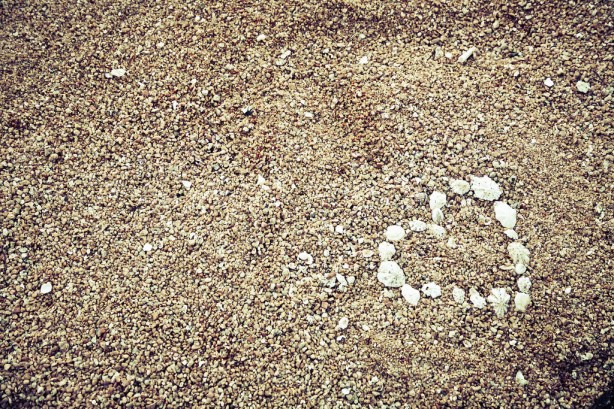 A couple of weeks ago, I landed the lucky task of preaching on Mark 1:29-45. Healing ministry is something that I have personally struggled with a fair amount – especially the idea that some people have their prayers answered and some don’t, and some don’t even have people around them to pray. But a few people said that this had been helpful for them, so I thought I might post it, and try and improve my recent average of one post a year…
A couple of weeks ago, I landed the lucky task of preaching on Mark 1:29-45. Healing ministry is something that I have personally struggled with a fair amount – especially the idea that some people have their prayers answered and some don’t, and some don’t even have people around them to pray. But a few people said that this had been helpful for them, so I thought I might post it, and try and improve my recent average of one post a year…
Introduction
Changing Lanes video clip Dodgy Steering
Do you ever feel like there is something lacking? Like there is something wrong with the world? Like things aren’t as they should be? Do you every sense there’s something more or long for something better?
This is the beginning of an episode of a course we have been participating in at our youth group called Changing Lanes – it’s all about what it means to be a Christian, it’s a bit like Alpha. This session is all about sin in the world and the fact that things aren’t as God planned them to be. We’re going to be talking about Jesus’ response to the world around him – the way that he dealt with the problems immediately facing him. We’re going to see his power and his compassion in helping those in such great need, and also his total reliance on prayer to fuel his actions throughout. Is there something lacking in your world at the moment? Is there an area that needs God’s healing touch? How will you respond when that healing comes?
Is there something lacking, something needing healing for you? I remember once when I was at school, the teacher who ran the Christian Union decided to invite the whole CU over to his house for a BBQ but failed to ask his wife first. Needless to say, the event did not happen! Simon and Andrew had invited Jesus and James and John for lunch after they had been to the synagogue together earlier in the day. I imagine in might have been a last minute invitation that may well have created some tension when they arrived to find Simon’s mother-in-law in bed with a fever. But this was no problem for Jesus who helped her out of bed, healing her in the process. Her immediate response is one of gratitude, and lunch is served after all. I’m sure it helped Simon’s relationship with his mother in law no end!
But this healing sparks off the crowds – something new and exciting is happening here. People want to know more, and they want solutions and help for all their own brokenness. The whole town gathered at Simon’s house in hope of healing and of deliverance.
Early in the morning, Jesus slips off alone to pray and escape the crowds in the process. The disciples find him and they decide to go through lots of Galilean villages to cast out more demons, to preach and to heal. One particular incident is described – that of a man with leprosy. He asks Jesus if he is willing to make him clean – to help him to be rehabilitated in a society that was terrified of the infection of wasting skin disease. Of course Jesus is willing – he is even willing enough to touch him and the man becomes clean – almost like a positive infection of cleanliness from Jesus. Jesus sends him on to the proper channels – probably so that people could know that he was really healed as otherwise they wouldn’t go near him. But instead the man tells everyone who Jesus is and what he had done for him, and so everyone wanted a bit of the action – everyone wanted something healed, something changed. For everyone, there was something lacking. Then the crowds became a problem, as they surrounded Jesus. There was no more privacy to be had! The full flow of Jesus’ ministry had begun.
Let’s take a quick look at what healing is and involves here. Jesus simply touches the man, having reached out his hand. Literally, it seems like the healing flows from Jesus into the man, allowing him to be clean or healed. (Leprosy was a defiling skin disease, not only making sufferers ill but also making them unclean. Ultimately it was a killer, and inspired great fear – not unlike ebola today.)
Healing is an awkward topic because, quite honestly, we’re working in the dark. We know that some people are healed in fantastic and marvellous ways, and quite frankly, some aren’t. We’ve all heard the stories of cancerous tumours receding, or broken backs being mended, and even in some cases, of the dead coming back to life. But then we all know people who haven’t been healed, and every funeral marks an unanswered prayer. There often isn’t any rhyme or reason to it either – sometimes it seems that the worst things happen to the best people.
Sometimes healing can be dramatic and almost theatrical, sometimes it happens through the skill of medical professionals. There is absolutely no reason why an all powerful God can’t do either and both. And it’s in passages like these ones where we see God’s heart for healing. We see the compassion Jesus has for those in need – healing even when he is himself exhausted and is seeking peace and quiet. We even see his indignation – some versions of the original even say that Jesus was angry here. It’s likely that people copying the original manuscripts changed the word because they didn’t want to think Jesus could be angry. But he was angry at the brokenness displayed in front of him. He was angry that people suffer from illnesses such as leprosy. He was angry because there was something lacking.
Some of the people Jesus touched had been suffering from demons. Now, this is quite hard to explain, because when we think of demons, often the first thought to come to mind is of a little cartoon devil, complete with pitchfork and horns. We probably don’t have many of them living inside of us. Or alternatively something rather like a lot of weird creatures living in us and feasting on us. Another common assumption is that the language of demons is a way to express mental health issues, which people two thousand years ago did not properly understand. Although there are some elements of that, I’m not sure that that is the full story. I believe that a better explanation lies in the fact that there are forces of darkness in this world, and those forces have had an impact on many of us in negative ways, leaving behind them marks. Those marks are the “demons” we have to face. Some of them might scream louder than others and affect us more or less. Some of them may well manifest through mental struggles and difficulties. But the most important thing to remember is that the battle has already been won – and not by those forces of darkness. When we welcome Jesus into our hearts, he starts the process of transformation, gradually putting to death each of our demons.
I don’t know if anyone saw Newsnight the other night, where Katherine Welby-Roberts, the daughter of the Archbishop of Canterbury spoke about mental illness and the affect it has had on her life? She also mentioned how the church can be behind on these issues and in offering support for anyone affected. She said that we are quick to point to verses and demon possession, and we’re slow to walk alongside people as they recover. I found an online blog – an article about World Mental Health Day written by someone called Helen. She starts with a tweet:
“‘My name is Helen. I have PTSD & struggle with depression. I am not a freak and I am not demon possessed. #WorldMentalHealthDay #EndTheStigma’ Why? Because I am not a freak. And because my experience over the years has been of being told if I just prayed more, had more faith, or trusted God then I would not struggle with depression, or the issues surrounding the PTSD. I’ve been told many times that I have demons. I’ve been told I am demon possessed. I’ve been told if I honoured God more/was more in love with Him then He would ‘take away’ the blackness. I’ve been told by a Pastor that if I was truly a Christian my story would be erased from my mind, and I would not suffer because of it, therefor depression should not be a part of my life. I’ve been told by another one that I was too much for him, their church, and probably God because the ‘Devil’ really had hold of me. I’ve been told many things. And we wonder why people fear being open and honest about mental health issues they face. We wonder why the last place a person would think about going when in mental health distress is a church. And we wonder why people end up more hurt and damaged by the responses of people, who not only misunderstand but who are often wilfully ignorant of the wider issues.”
Let’s not be a church like that.
Some healing happens fast, some happens slow, and we, as the church, as the Body of Christ, really should be ready to walk alongside people and help them through their struggles, whether improvement happens fast or slow. But what about you? Is there something in your life that needs to see God’s healing touch? Is there a part of your life that needs mending? That feels damaged and abused and hidden away? Why not bring it before God today in prayer.
It goes without saying that someone who offers healing becomes immensely popular, and Jesus certainly was no exception there. Crowds followed him everywhere and it seems that they invaded his personal space. And the same happens here – we know that ministries offering healing to the world are immensely popular, even if people are only going along because in their minds they don’t really quite believe it can really happen. But inside of people there is a desperation, a need to see thing put right in the world and in our lives. Because we can all see that there is something lacking, and something wrong with the way things are at the moment.
There is something wrong though, when people are only interested in Jesus because of his healing power – because as he says himself, he has come to preach a message of hope to the people. Healing physical ailments is only a small part of that message of hope, which encompasses every aspect of our lives in the past, the present and the future. Because when people are attracted to Jesus only because of the healing he has given them, there is something lacking – they are missing out on the bigger picture.
Part of this can be linked with some issues and difficulties with healing ministry in itself. Firstly, however dramatic the healing, ultimately even Lazarus died again. Physical healing in this world is only temporary. Secondly, if we struggle with the decay and ageing symptoms of our bodies, we start struggling with the identity of a whole cross section of our society – what are we saying about the elderly, if everyone’s health has to be perfect all the time? Finally, what about those whose ailment is an intrinsic part of them? I know a young girl with Asperger’s syndrome, which makes her less aware of others and their sensibilities – but that is part of who she is. Can she be healed from that?
Healing is a foreshadowing of the kingdom of God – it is temporary hope of a permanent reality. It isn’t the be all and end all, but it is an amazing gift when it happens – and God works in many fantastic ways and brings healing in places we can only imagine.
How will you respond? Something is lacking but there is great hope. In this passage, we see two different responses to that great hope – firstly Simon’s mother-in-law gets up and waits on Jesus and his disciples. Her response is to give all she can in that instant in worship. She is overwhelmingly grateful for what has happened. And Jesus and the disciples get a free lunch.
The man who Jesus cures of leprosy is a bit different. Jesus told him to go through the proper channels of healing and cleansing in the Temple, part of which involved offering a sacrifice, saying thanks to God for the healing and marking the fact that God had done this. But instead, the man tells everyone that Jesus healed him. In some ways, it is perfectly understandable – it is rather exciting, and I know that I’m not exactly good at keeping secrets myself. His response is excited , but there is something lacking – his response doesn’t especially honour God.
Throughout this passage, we have seen contrasts between light and darkness, public and private and hiddenness and openness. It underlines the brokenness of the world and the hope of the Light of the World coming in Jesus to mend things, to cast out the demons and to announce the message of hope.
Which response will you choose to the healing Jesus has done in your life? Will you give him the honour and glory or does that get a bit lost in all the excitement? Do you immediately seek to worship in a public way, or does everything remain hidden?
Light shining through the darkness is what transforms us. Where is the transformation happening in your life? Light shining into the darkness that sin leaves behind brings healing and makes us new, casting out the demons our past may have left behind.
Of course Jesus is willing to bring healing and transformation. But are we willing to come to him and seek it? Are we willing to be vulnerable and bring the darker parts of our lives into the light? It may not be easy, and it might take work and prayer. But it will always be worth it.
And we know that many things in our world are totally broken. That there is something wrong and something missing. Something lacking. There are hundreds and hundreds of children who will never grow up because of hunger and disease. There are hundreds and hundreds of girls who will be forced into prostitution. There are women who are subject to domestic abuse. There are people who genuinely believe that they have to send their partner pictures of themselves naked because otherwise their partner will look at porn. The rich are getting richer and the poor are getting poorer. There are long queues at the food banks. The world is suffering from ebola. There are wars. The list goes on.
But what are we going to do about it? We worship a God who brings healing into a broken world, and we know that we are God’s handiwork, created in Christ Jesus to do good works, which God prepared in advance for us to do. When we know that those are true, we know that the world is waiting for us to stir into action – to do something to try to help. We might not be able to change much, but that doesn’t mean we can’t try to change something. To what part of God’s creation is he calling us to do those good works? What change can we seek to bring about in his power? It might be physical healing or it might be some other part of the hope we have in Christ.
Fuelling healing by prayer We heard how Jesus spent lots of time by himself in prayer. He withdrew to spend time with his Heavenly Father, even when it was still dark. He spent time being fuelled and re-fuelled through prayer, building up his relationship with God.
Needless to say, that any healing we seek after, whether in doing or having it done to us should be totally wrapped up in prayer. Because the only one to bring healing is God – we are merely his instruments. Nothing happens without prayer.
And that is why we offer prayer ministry support here. We offer people to pray with, whether about something specific or something that remains completely private. We offer people who can prayerfully take your concerns to our Heavenly Father, just as Jesus did. We offer people who can walk alongside throughout the whole journey of being healed in body, mind and spirit. And I think that that sounds like a great offer which can sometimes be a bit underused really!
So if there is anything, big or small, ingrowing toenail or world shattering reality (and I did once hear a testimony about how God healed someone’s veruccas) come and have some prayer. Nothing is to large or too small. It’s an open invitation, so come!
Conclusion Jesus is the answer to all that is lacking in our world. As the guy in the video was saying earlier, it might feel sometimes that there is something wrong, something broken and something lacking. But Jesus makes up for it and shines his light into the darkness and binds up the brokenhearted. Don’t you just want some of that in your life?
But is that all we want? Let’s not miss out on the bigger picture – the one that mends not only our physical reality but also all our inner brokenness, and the permanent reality of the world with no more sadness, no more death and no more tears. Lets not miss who Jesus is in our enthusiasm for the healing he brings. And lets respond to him with service, and with worship. And around all of that, let’s be fuelled by prayer, without which we are nothing at all.









